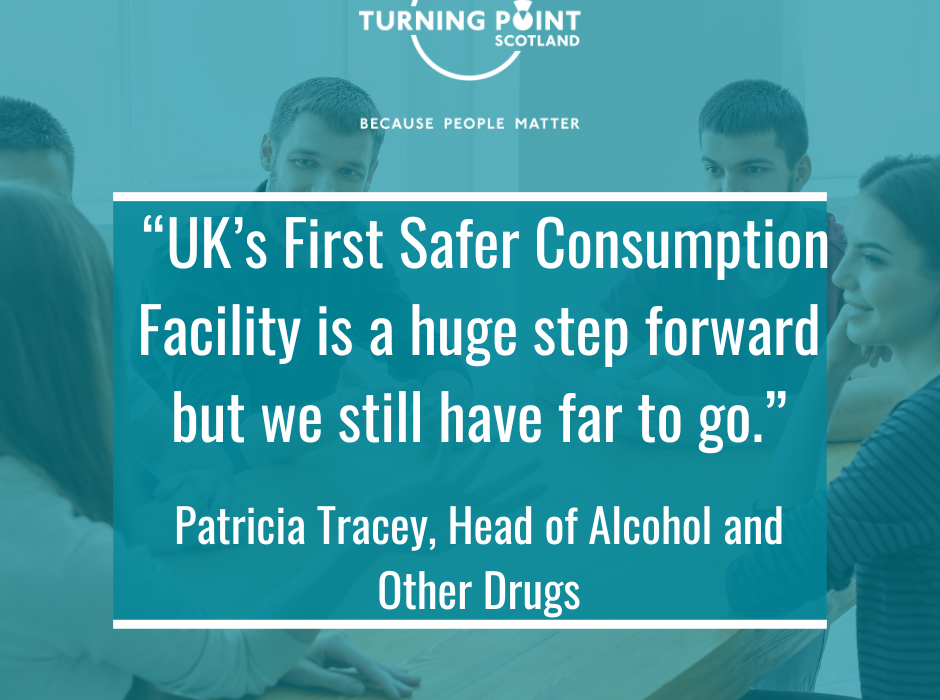The opening of the Thistle – the UK’s first official Safer Consumption Facility (SCF)– in Glasgow today is a huge step forward. I’m taking a moment today to acknowledge how far we’ve come, but also to think about how far there still is to go.
I want to start by acknowledging the hard work, commitment and perseverance of all the people who have contributed to this achievement. The Glasgow Health & Social Care Partnership (GHSCP) team have faced barriers that have seemed at times to be immovable; we have seen first-hand how they have not only kept at it, but have really listened to the people they are trying to reach, and kept them at the heart of this work. All those people with lived and living experience who have shared their experiences, their ideas and their trust with the services working to do better; their engagement has been invaluable at every stage. We must also acknowledge the impact of the campaigners, who through their direct action have undoubtedly helped to push this conversation forward and, crucially, have reached people when official services could not.
This SCF adds a new and much needed layer to the support available to people in Glasgow. While people have access to the crisis centre, to 24/7 needle exchange services and mobile harm reduction services, they have often not had access to a clean and safe place to use the equipment we provide. We are now able to meet a need that has been there for a long, long time.
The process of building this service started a decade ago, through assertive outreach with people using drugs in Glasgow city centre. We worked with them to reduce the risk they faced and the harm they experienced, and to learn directly from them about what was working, and what was not. Taking Away the Chaos, the public health analysis published in 2016, told the story of what people needed, of the gaps in the system, and informed GHSCP’s proposal for a pilot SCF.
Even then, SCFs were an established and well-evaluated service model, with services opening in Switzerland, Germany, the Netherlands, Spain, Luxembourg, Norway, Canada and Australia since the 1990s. They offered a clinically safe space, but were much more than a health response – the inclusion of social care and support meant that people were treated as people, not health conditions. The evidence was extensive and it was clear – SCFs are effective in reducing drug related deaths, reducing the transmission of blood borne viruses, reducing public injecting and associated ‘drug litter’ and increasing the number of people entering treatment.
The Scottish Government were clear in their support for the pilot, and in the same year, the Advisory Council on the Misuse of Drugs (ACMD) recommended the introduction of SCFs, a call repeated by two parliamentary inquiries at Westminster – the Scottish Affairs Committee Inquiry into Problem Drug Use in Scotland and the Health Committee Drugs Policy Inquiry – in 2019. The legislation standing in the way of the pilot – the Misuse of Drugs Act 1971, which creates specific offences that would apply to SCFs – is reserved to Westminster, and they remain firm in their position against these services.
Even after all this time, we haven’t removed this barrier – we’ve just found a way around it. And it’s worth asking why that is. Why has it taken us 10 years to take this step? Why, when Glasgow completed their own public health needs assessment, rooted in the lived and living experience of people at greatest risk, and identified the local need for this service? Why has it been so hard to commit to a service with such a strong basis in the evidence of what works, especially as the number of people dying drug related deaths continues to rise?
The Misuse of Drugs Act has been strongly criticised for being unclear, contradictory, discriminatory, and ineffective. It is routed in a ‘War on Drugs’ ideology, a belief that punishing people who use drugs – but only those specific drugs listed in the MDA – is the best way to deter or discourage drug use. On every measure, this approach has failed, but it also creates further harm by standing in the way of public health or evidence-based approaches. When we try to innovate, to act on the evidence of what works – this SCF pilot, Heroin Assisted Treatment, Drug Checking Services – every move is constrained and delayed by the limits of the MDA.
But if the MDA is the hurdle, then moral judgement, and the stigma that flows from it, are the concrete foundations holding it firmly in place. The law was, in fact, designed to be flexible and to allow our response to adapt and develop, and it has done so – for example, although Section 6 of the MDA prohibits ‘providing paraphernalia for Class A drug consumption’, the 2003 Regulations relaxed this offence, allowing drug treatment services to provide harm reduction equipment. We just need the political will to do it, and that depends on what the public thinks.
It’s the shift in public and political opinion – and willingness to act – that this new service represents, that gives me the most hope for the future.
So today we are grateful. This is such a breakthrough, not just for Scotland for the whole of the UK, and we recognise all the hard work that has led us here. But the sad truth is that this ground-breaking service is already out of date. More people are smoking instead of or as well as injecting their drugs, and smoking drugs is not permitted in the Thistle. The evidence base has also grown, showing how the environment influences people’s engagement, with a relaxed, informal and comfortable setting much more effective than a clinical one. This is no criticism of GHSCP – we have worked alongside them as they have developed the service, and the service opening today is as close as we could get to what people want and need as the system would allow. The team deserve credit for how much they have achieved, but that system needs to change.
As the case for a SCF in Edinburgh develops, and hopefully other locations too, we will work to ensure that they can build on what has been achieved in Glasgow and move us further forward.
Turning Point Scotland will continue to call for improved harm reduction and recovery support for people using drugs other than heroin, and for people who smoke their drugs. We continue to develop our own responses to poly-drug use, to new harms as new drugs enter the market, and to alcohol related harm.
Importantly, we will continue to challenge the stigmatisation of people who use drugs in our practice, in policy, and in public discourse. This stigma has been powerful enough to delay a service that was proven to work for ten years. We cannot wait another 10 years for the next step forward.

